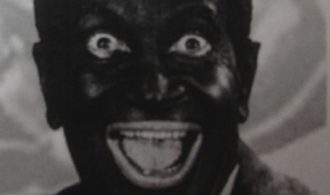I received an email this morning with the letter below and find it appropriate to discuss / post here.
I do not agree with Blackface and certainly do not agree with”Brownface” to depict Asian Americans. It seems that with the diverse acting pool in the city, The Roundabout would have found a way to use it.
As a playwright, I can respect the way a play is written and understand staying true to the script, however, we are no longer in the 19th century — people of color have more than a great deal of rights (we are all equal), so why do the play at all??
It could be a matter of personal taste and most likely a matter of subscribers…. this is the type of play they will attend, this is the type of play that puts The Roundabout as much in the black as possible.
I am a theatre artist, a producer, a woman of color…. I might understand why this play was chosen, but I don’t have to like it.
If I get the chance to attend a performance, I will surely report back.
For now, read below and be your own judge.
____
AAPAC Opposes Brownface in Roundabout Broadway Production
After seeing The Roundabout Theatre Company’s Broadway production of “The Mystery of Edwin Drood” and receiving numerous complaints about the use of brownface in the production, AAPAC feels it is necessary to release the following public statement:
We were deeply disappointed to see white actors impersonating characters of South Asian descent complete with brown grease paint, appropriation of costumes and dance movements and relying on stereotypes in place of characterization. The obvious talents of the actors notwithstanding, the use of brownface had the effect of being extremely surreal and alienating, as if a joke was being told that was not intended for the Asian American community to hear.
We understand that the racism inherent in this musical is a reflection of the social mores within 19th century British panto and Music Hall traditions. Director Scott Ellis was being true to tradition, historical precedent, and to the story itself.
However, we would assert that if these characters came from the British colonies of Jamaica or Cameroon, and not the British colony of Ceylon (now present day Sri Lanka), blackface would never have been utilized in the same casual way. Today, you would never see a white actor in blackface playing the title role in “Othello” with the excuse of, “oh, well, that’s what was done in Shakespeare’s day.” We wonder why minstrelsy is acceptable when it comes to Asians?
The Roundabout production seems to show little awareness of the long history of Asian impersonation we are trying to put behind us or how racial politics and demographics have changed even in the 28 years since this show first premiered. There were a myriad of ways Mr. Ellis could have handled this issue with more sensitivity. For one, he could have hired actors of actual South Asian descent. Or, if he wanted to preserve white actors in these roles, the use of brownface would have been more ironic or satirical had the entire ensemble been cast multi-culturally. This would have been particularly effective since Hispanic-American star Chita Rivera was already in the cast. However, we have heard from quite a few members of the Asian acting community, including those with major Broadway credits, that requests from their representatives to secure an audition were denied.
The Roundabout Theatre Company does not have a good record when it comes to inclusive casting. Last year, we released a report looking at the percentages of actors of color hired at 16 of the top not-for-profit theatre companies in New York City over a five year span. The Roundabout made our list of the five theatre companies least likely to hire actors of color. In fact, they ranked second to lowest.
We are reaching out to the Roundabout to engage in closed-door discussions about these issues and are hopeful that they will accept our invitation. We are certain that their record does not reflect a conscious policy of exclusion and we hope that by bringing these issues to a more conscious level, the Roundabout can become an ally in an industry-wide commitment to more inclusive casting.
In the meantime, if you feel as strongly as we do, it would be very helpful if you take two minutes to send Artistic Director Todd Haimes a short missive via their FB page:
https://www.facebook.com/RoundaboutTheatreCompany.
Until there is conscious attention given to these issues throughout the industry, opportunities for American actors of Asian descent–and all actors of color– will never be truly equal.
Yours in Solidarity,
The AAPAC Steering Committee
Pun Bandhu, Cindy Cheung, Kimiye Corwin, Angel Desai, Siho Ellsmore, Christine Toy Johnson, Peter Kim, Julienne Hanzelka Kim, Nancy Kim Parsons, Kenneth Lee, Allan Mangaser, Eileen Rivera
___
View the Letter in Original Format
AAPAC on Faceook
AAPAC = Asian American Performers Action Coalition


